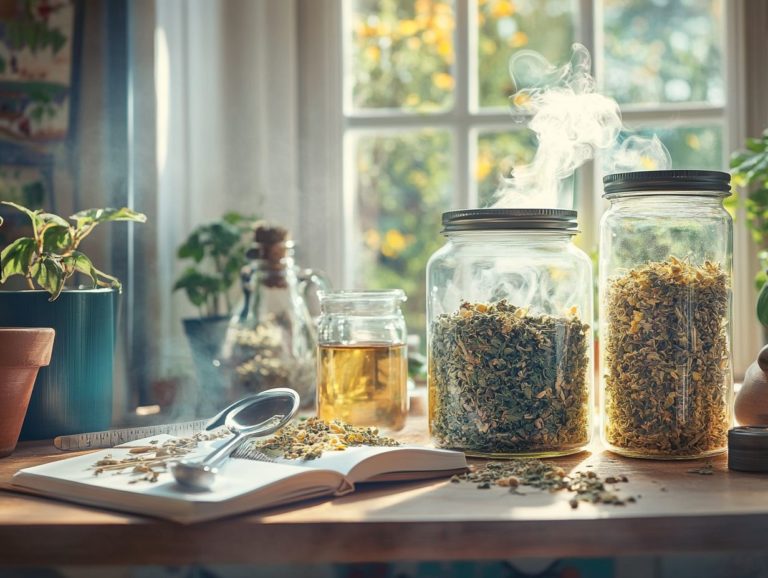Top 5 Herbs with Known Safety Profiles
Herbs have long been celebrated not only for their delightful flavors but also for their remarkable health benefits.
This article delves into five popular herbs chamomile, peppermint, ginger, turmeric, and echinacea that come with strong safety profiles and an array of therapeutic properties. You’ll learn how to easily incorporate these herbs into your daily routine, explore their potential side effects, uncover possible drug interactions, and find recommended dosages.
Plus, you ll get valuable tips for ensuring the quality and safety of your herbal choices.
Whether you’re an experienced herbal enthusiast or just starting to explore natural remedies, discover how these powerful plants can transform your health today!
Contents
Key Takeaways:
- Chamomile, peppermint, ginger, turmeric, and echinacea are safe herbs with known herbal safety profiles.
- These amazing herbs can boost your health in multiple ways and can be incorporated into daily life through teas, supplements, and cooking.
- While generally safe, potential side effects and drug interactions should be considered when using these herbs.
1. Chamomile
Chamomile is a well-known herb, celebrated for its many health benefits and used in natural healing methods for centuries as a soothing remedy for various ailments. When enjoyed as an herbal tea, it promotes relaxation and well-being while offering anti-inflammatory properties that are essential for your overall health.
Beyond tea, chamomile is available in various forms, such as liquid herbal extracts and essential oils, catering to different preferences and needs. Traditionally, it has been used to alleviate digestive issues, support sleep, and reduce anxiety, making it a perfect fit for natural healing methods.
The medicinal properties of chamomile stem from its rich array of antioxidants and anti-inflammatory compounds, which have piqued the interest of researchers. Studies have shown its effectiveness in promoting calm and aiding sleep, boasting a favorable safety profile that makes it suitable for most individuals.
However, exercise caution if you have allergies to plants in the Asteraceae family. This remarkable herb remains a cornerstone for many seeking natural solutions to their health concerns, especially when considering herbal treatments.
2. Peppermint
Peppermint stands out as a remarkably versatile herb, known not only for its invigorating flavor but also for its many health benefits. It has earned a solid reputation in herbal medicine, making it a favored choice for herbal extracts and dietary supplements designed to enhance digestive health and sharpen mental clarity.
Research indicates that peppermint can effectively alleviate symptoms associated with indigestion, bloating, and gastrointestinal discomfort. Many individuals find relief through this natural remedy, discovering a path to wellness without the need for pharmaceuticals.
This herb can also invigorate the mind, enhancing focus and diminishing fatigue particularly beneficial during high-stress moments. You can enjoy peppermint in various forms, whether it s a soothing cup of tea, concentrated oil, or easy-to-swallow capsules, seamlessly integrating it into your daily routine.
Research supports these benefits, underscoring peppermint’s positive impact on both the digestive system and cognitive performance. This makes it a valuable asset in any natural wellness strategy.
3. Ginger
Ginger is a remarkable medicinal herb, known for its anti-inflammatory properties and its ability to address a range of health concerns, from alleviating nausea to supporting digestion. This makes it an invaluable addition to your herbal treatments and wellness routines.
You ll find this versatile root particularly beneficial when combating nausea from motion sickness or morning sickness during pregnancy, offering a natural alternative to conventional medications. The potent antioxidants in ginger can also help reduce inflammation, which may ease discomfort for those dealing with arthritis and other chronic pain conditions.
To reap the maximum benefits, you can enjoy ginger in various forms be it teas, capsules, or fresh slices. A daily dose of 1 to 2 grams is generally considered safe for most individuals, but it s wise to consult with a healthcare provider, especially if you’re pregnant or taking medication, to ensure there are no adverse reactions.
Frequently Asked Questions
What are the best ways to use these herbs?
You can use these herbs in teas, supplements, or as cooking ingredients to reap their health benefits.
Are there any side effects associated with these herbs?
While generally safe, some individuals may experience side effects. It’s best to consult a healthcare provider for personalized advice.
4. Turmeric
Turmeric is known for its health benefits, particularly its powerful anti-inflammatory properties. It s a key ingredient in holistic remedies aimed at improving joint health and overall wellness for those looking for natural alternatives.
The active compound, curcumin, is famous for its ability to combat damage caused by free radicals and inflammation. This leads to many health benefits, including enhanced immunity and better digestion. Numerous studies have highlighted curcumin s effectiveness in alleviating symptoms related to chronic conditions like arthritis and some types of cancer.
You can easily add turmeric to your daily routine. Whether you mix it into smoothies, golden milk, soup, or take a supplement, enjoying its benefits is simple.
Research supports curcumin’s safety when consumed in moderation, making it easier to incorporate into everyday diets.
5. Echinacea
Echinacea is a well-known herbal supplement praised for its immune-boosting powers. It’s commonly used in herbal medicine to promote health and prevent illness, making it a favorite in both herbal apothecaries and holistic healthcare.
There are various types of Echinacea, such as Echinacea purpurea, Echinacea angustifolia, and Echinacea pallida. Each variant offers unique health benefits. For example, Echinacea purpurea is often effective for shortening the duration of colds and flu, while Echinacea angustifolia is known for its anti-inflammatory properties.
The general recommendation is to take 300 to 500 mg of a standardized extract three times a day. However, it’s wise to consult your healthcare provider for personalized advice. Some individuals may experience allergic reactions or gastrointestinal issues.
Research shows that Echinacea can stimulate immune activity, making it a strong choice if you re looking for herbal support for your health needs.
What Are the Benefits of Using These Herbs?
Using these remarkable herbs chamomile, peppermint, ginger, turmeric, and echinacea provides many health benefits that enhance your well-being. They are essential additions to your herbal remedies and holistic treatments tailored to your needs.
Chamomile stands out for its calming effects, promoting restful sleep and soothing digestive issues. Peppermint is versatile, supporting digestive health and relieving headaches. Ginger helps alleviate nausea and boosts immune function due to its anti-inflammatory properties.
Turmeric plays a critical role in combating inflammation and may assist in managing chronic illnesses. Meanwhile, echinacea is known for strengthening immune defenses.
Incorporating these herbs into your daily routine through teas, supplements, or culinary delights offers a natural health approach that emphasizes prevention and holistic wellness.
How Can These Herbs Be Used in Daily Life?
Incorporating herbs like chamomile, peppermint, ginger, turmeric, and echinacea into your daily life is straightforward. You can use them in herbal preparations, culinary dishes, and dietary supplements to boost your health.
For example, brewing a calming chamomile tea before bed not only promotes relaxation but also aids digestion, making it great for your nighttime routine. However, it’s important to follow proper guidelines when using herbs. Consider referring to the 5 guidelines for safe herbal dosing to ensure you’re using herbal remedies effectively. Peppermint adds a refreshing twist to meals, enhancing salads or smoothies while supporting digestive health.
When choosing supplements, opt for high-quality sources. Look for capsules containing standardized extracts to ensure safety and efficacy. By making these simple changes, you can easily incorporate herbs into your life, nurturing both body and mind with natural remedies, including the 5 best herbs for digestive health.
What Are the Potential Side Effects of These Herbs?
Stay alert! Knowing potential side effects and the risks of herbs is crucial, particularly regarding dosage and your unique sensitivities.
Being aware of the common side effects can help you sidestep adverse reactions think digestive discomfort from ginger or allergic responses to echinacea. Be cautious about possible interactions with medications like blood thinners.
Consult healthcare professionals before diving into any new herbal treatments, especially if you have pre-existing health conditions. A knowledgeable provider can help you tailor your herbal use to your specific health landscape, ensuring safety while effectively enhancing your overall wellness. Consider exploring 5 must-try herbs for stress management as part of your approach.
Are There Any Drug Interactions to Be Aware of?
You must be well-informed to ensure your safety when considering herbs like chamomile, peppermint, ginger, turmeric, and echinacea. Potential drug interactions can significantly impact the safety and effectiveness of both herbal supplements and prescribed medications.
For example, chamomile can amplify the effects of blood thinners like warfarin, raising the risk of excessive bleeding. Peppermint might hinder the absorption of certain pharmaceuticals processed by the liver. Similarly, ginger increases bleeding risks when combined with blood thinners; it’s important to consider 5 herbs with specific dosage recommendations for safe usage.
Turmeric could unexpectedly lower blood sugar levels, potentially affecting the efficacy of medications used for diabetes management. Meanwhile, echinacea might interfere with medications that lower the immune system’s response, which could compromise your treatment plan.
Given these considerations, consult with healthcare providers before embarking on any herbal regimen. Professionals can offer guidance on appropriate dosages and potential risks, ensuring safe herb use aligned with your current health strategies, including insights on 5 herbs for enhancing longevity.
Recommended Dosages for Common Herbs
Determining the right herbal dosage for chamomile, peppermint, ginger, turmeric, and echinacea is vital for maximizing health benefits while minimizing risks. Remember, dosages can vary based on your individual needs and the form of herbal preparations you choose.
- Chamomile: 1 to 4 grams of dried flowers daily or 1 to 2 cups of chamomile tea.
- Peppermint: 0.2 to 0.6 mL of an extract or as a tea.
- Ginger: 1 to 2 grams in capsules.
- Turmeric: 400 to 600 mg of standard extract, taken three times a day.
- Echinacea: 300 to 500 mg three times daily as an extract.
Start at the lower end of these recommendations, especially if you have existing health conditions or are younger, and adjust based on how your body responds over time.
How Can One Ensure the Quality and Safety of These Herbs?
Ensuring the quality and safety of herbs like chamomile, peppermint, ginger, turmeric, and echinacea is essential for effective use in healthcare. This requires diligent attention to sourcing, quality seals, and adherence to established herbal guidelines.
Seek products that showcase certifications from recognized organizations, indicating rigorous testing and quality assurance. Look for quality seals that signify compliance with best practices in herbal safety. Consider the origins of these herbs; reputable brands typically offer transparency about their supply chains and cultivation methods. Additionally, explore 5 common herbs with healing properties to enhance your understanding of effective herbal options.
As a consumer, understanding the importance of herbal conservation and supporting sustainable practices is vital. This ensures that these valuable plants are preserved for future generations while fostering a responsible market that balances health benefits with ecological stewardship. Additionally, being aware of 5 herbs that are safe with minimal dosage can enhance your herbal use responsibly.
Frequently Asked Questions
What are the Top 5 Herbs with Known Safety Profiles?
The top 5 herbs known for their safety profiles are turmeric, ginger, garlic, ginseng, and echinacea.
What makes turmeric a safe herb?
Turmeric has been used in traditional medicine for centuries. It has a solid history of safety, with few reported negative side effects.
How is ginger considered safe?
Ginger has been a popular culinary and medicinal herb for thousands of years. It is known for having a low risk of side effects.
What safety measures should be taken with garlic?
Garlic is generally safe, but it’s wise to consult a healthcare professional. This is especially important if you’re on blood-thinning medications or have a bleeding disorder.
Is ginseng safe to use?
Ginseng is renowned in traditional medicine for its health benefits. However, it can interact with certain medications, so check with your healthcare provider before using it.
Can echinacea cause side effects?
Echinacea is usually well-tolerated and has a strong safety profile. It may cause stomach upset or allergic reactions in some individuals, so be cautious.






